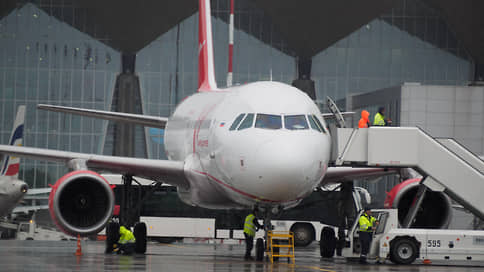Underflight carpet – Newspaper Kommersant No. 35 (7480) of 03/01/2023
[ad_1]

The unprecedented closure of the St. Petersburg airport under the “Carpet” plan due to what the Ministry of Defense called exercises may scare away some air passengers and force them to choose trains more often, according to the industry. The number of flight cancellations due to safety concerns or delays is small, but noticeable to the industry in any force majeure, including bad weather. All costs in such situations are borne by the airlines: in addition to fuel costs, passengers have the right to demand the return of tickets, as well as compensation for delays and disruption of plans. The carriers note that the episode at Pulkovo cost “affordable, but significant” sums, and hope for the stabilization of the situation.
The closure of Pulkovo Airport may have a negative medium-term impact on passenger traffic, according to experts interviewed by Kommersant. The restrictions under the “Carpet” plan on February 28, which implied a ban on flights within a radius of 200 km from St. Petersburg Airport, lasted about two hours and ended by noon. Initially, it was reported that the fighters were raised in connection with the discovered unidentified object, presumably a drone. In the Ministry of Defense assuredthat did the “training”. In a number of other regions of the Russian Federation, including near Moscow, drones fell on the same day.
According to the Pulkovo online scoreboard, the two-hour operation of the regime led to the delay of about 25 flights.
The carriers of the Aeroflot group, S7, Smartavia and Turkish Turkish Airlines, flying from Antalya, had to deploy aircraft, among other things. Aeroflot canceled four flights and delayed five, Rossiya delayed six, not counting return flights. Two S7 aircraft were delayed for an hour, Ural Airlines reported that “by a lucky coincidence” they were able to meet the schedule. Aeroflot Group, S7, Azur Air and other carriers flying to St. Petersburg declined to comment.
An interlocutor at a large company noted that the industry had not been warned about the upcoming exercise, but the costs “are regarded as small on a business scale.” A Kommersant source added in another that in winter, carriers are “ready to circle over airports in bad weather” and foresee such costs in advance. But, despite the “affordable financial expenses”, the company faced “increased attention and calls from passengers” of future flights regarding their possible cancellation or delay, especially on the Moscow-Petersburg route. There were no refunds, he said.
A source in another company is ironic that the question of “who will pay for the “training”: UFO, ZVO or the Armed Forces of Ukraine” is extremely relevant for them. They clarified that the total cost of a flight from St. Petersburg to Moscow on a medium-haul aircraft is about 1.2-1.5 million rubles, but they do not plan to make claims to either the Ministry of Defense or the airport “for obvious reasons.”
Smartavia, which had to delay nine aircraft at different airports, confirmed to Kommersant that “the costs for the airline are very significant,” without specifying the amounts.
There were no cancellations of flights and mass delivery of tickets in connection with the incident.
Carriers’ costs in such situations depend on the flight time to the alternate airport, the need to refuel or change the aircraft, the accommodation of the flight passengers in the hotel or the parking time at the alternate airport. All expenses in case of any force majeure are borne by airlines, not airports, notes independent expert Elena Sakhnova, “whether it be a second round or going to an alternate airfield due to bad weather conditions, and in the event of anti-terror orders.” The cost of fuel alone for each additional hour of flight on a medium-haul aircraft is about 250 thousand rubles. She notes that “non-dramatic on a business scale” costs could be higher if passengers demand accommodation or refunds.
Two companies added that there were no conflicts with clients because of the situation in Pulkovo, no one needed psychological help. “Some did not even understand what happened, some did not believe in the version about the exercises, but remained calm,” one of Kommersant’s interlocutors describes.
“For the first time, for the sake of“ training ”, the third airport in terms of passenger traffic in the country is being closed, but if carriers are already difficult to surprise, then the absence of loud complaints from more than 2 thousand people who are late is good luck for the market,” a Kommersant source in the industry emphasizes.
Potentially, passengers have the right to refuse a flight and demand a refund from airlines or through ticket aggregators, says Ilya Zotov, head of the All-Russian Association of Passengers. Then the potential losses for each canceled flight, according to him, may exceed several million rubles. In some cases, passengers may demand in court compensation for other, including moral, costs: for a broken deal or a canceled operation. But in practice, it is rare to get funds, the expert says. If the courts uphold the passengers, the carriers will have to bear the costs, which, in his opinion, “are unlikely to be able to levy a penalty on the initiators of the cancellation of flights.”
After each such force majeure, the industry, according to Ilya Zotov, also faces emotional refusals to fly: “People tend to prefer the train to the plane against the background of the news.” Not only aerophobes fall into this category, but also business travelers. Their share in the total passenger traffic traditionally does not exceed 1-2%, the expert clarifies, but for companies, the losses can be quite noticeable.
[ad_2]
Source link





